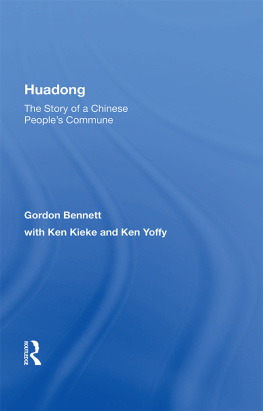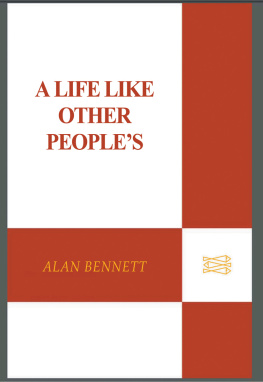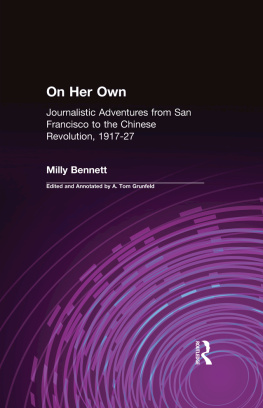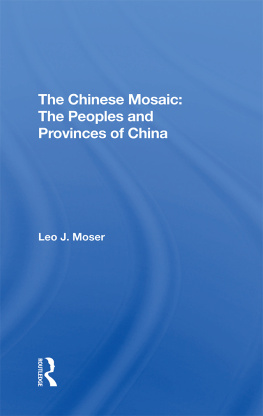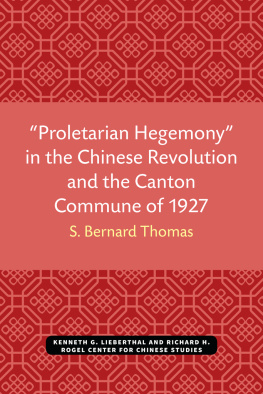Huadong: The Story of a Chinese Peoples Commune
Huadong: The Story of a Chinese Peoples Commune
Gordon Bennett
This topical and concise report on one commune in Chinas innovative commune system is designed to present key features of the system as a whole. The range of source materialscollected as a project of the Texas China Council and the University of Texas Center for Asian Studiesincludes official Chinese documents, criticisms of a prominent regional leader published during the Cultural Revolution, official statements to foreign visitors at Huadong, observations about the commune by foreign visitors and journalists, and recollections by local emigrs. The author emphasizes the personal views of commune residents, and calls attention to important changes over the last few years. The sixty-five photographs included in the book give a vivid sense of everyday life at Huadong.
An introductory essay on the concept of the commune in Chinese Communist Party policy is followed by chapters covering Huadongs government and politics, economy, society, and culture. The conclusion points to likely developments in the future.
Gordon Bennett, associate professor of government at the University of Texas at Austin, is a specialist in Chinese politics. He has interviewed Chinese emigres in Hong Kong during 19671969 and in 1975, and traveled in the Peoples Republic of China in 1976. Dr. Bennett is author of Yundong: Mass Campaigns in Chinese Communist Leadership (1976) and Chinas Finance and Trade: A Policy Reader (1978).
First published 1978 by Westview Press
Published 2018 by Routledge
52 Vanderbilt Avenue, New York, NY 10017
2 Park Square, Milton Park, Abingdon, Oxon OX14 4RN
Routledge is an imprint of the Taylor & Francis Group, an informa business
Copyright 1978 by Taylor & Francis
All rights reserved. No part of this book may be reprinted or reproduced or utilised in any form or by any electronic, mechanical, or other means, now known or hereafter invented, including photocopying and recording, or in any information storage or retrieval system, without permission in writing from the publishers.
Notice:
Product or corporate names may be trademarks or registered trademarks, and are used only for identification and explanation without intent to infringe.
Library of Congress Catalogue Card Number: 78-5025
ISBN (U.S.):0-89158-094-8 (hardcover)
ISBN (U.S.):0-89158-095-6 (paperback)
ISBN (U.K.):0-7129-8070-0 (hardcover)
ISBN (U.K.):0-7129-0882-X (paperback)
ISBN 13: 978-0-367-02085-9 (hbk)
One of the most interesting and thought-provoking experiences during my service as a member of the Texas State Legislature was spending sixteen days in China in 1977 as part of a delegation sponsored by the National Committee on U.S.-China Relations. During the trip I had an opportunity to study the agricultural endeavors of the country, including a visit to a peoples commune. What I saw there was much more than a large collective farm. It was an integrated community dedicated to two broad goalsfirst, to raising agricultural production, and second, as the Chinese say, to serving the interests of the individual, the collective, and the state. In communes like the one I visited, most farming tasks are performed cooperatively by whole villages of people in commonly owned fields. But in addition, communes manufacture and repair farm machinery, construct water control and hydroelectric projects, sponsor agricultural experimentation, introduce new technology, and provide farm credit. Orderly marketing of each crop is ensured by a local supply and marketing cooperative whose prices are neither higher in lean years nor lower when the harvest is plentiful.
Noneconomic activities of communes are also remarkable. Child care facilities are widely available to preschool children. In education, six years of primary school is available to all children, and a few years more of middle school is open to many. Training in agricultural science and technology is offered to full-time students, as well as to older farmers in short courses. In health, there is an expanding system of rural hospitals, clinics, paramedics, and medical insurance plans, and Chinese traditional medicine is actively practiced. Prices for Western drugs are low. Most daily necessities can be bought by commune members at nearby cooperative stores. Shortages often occur, but market conditions are stable overall. Almost no luxury items are available. Other essential activities in the commune include fire fighting, police protection, sports events, cultural performances, festival celebrations, and, of course, politics. The commune is the deepest level of local government in Chinas countryside, and offices of several national agencies, such as the Peoples Bank and Ministry of Public Security, are found in commune towns.
All this adds up to a novel way of organizing rural society, and one that may have significant lessons for other developing countries where farms are still as small and labor-intensive as Chinas were a generation ago. Now that the improvement of food supplies to undernourished people in the worlds poorer lands is gaining global recognition as one of the leading issues of our times, I think it is even more important to understand the distinctive strengths and weaknesses of Chinas commune approach. Moreover, China is achieving increasing importance as a world power, and the commune is part of the economic fabric of that power.
A good place to start toward developing an understanding of China and the commune system is this excellent case study of the Huadong Peoples Commune. Professor Bennett and his two student collaborators at the University of Texas at Austin have exhaustively pursued every accessible bit of information about Huadong. The result is a thorough examination, profusely illustrated, of all facets of life in a single Chinese commune. Specialists and nonspecialists alike will appreciate the authors concise presentation of relevant detail. The report is well organized and written in an easy-to-read style.
The authors consistently cast critical eyes upon their subject. While their study indicates an attitude of great respect for Chinese rural achievements under Communist Party leadership, the work is no paean to peasant life since the revolution. Their evaluation of Chinese rural policies stems from a longstanding interest in the dramatic confrontation between age-old problems of poverty and exploitation in China on the one hand, and revolutionary solutions on the other.
In current Chinese thinking, collective farms are an intermediate stage of ownership in the historical transition to communism. Only some day in the distant future, when the country is much more advanced economically and politically, will it be possible for China to realize the goal of complete state ownership of farms. In the meantime, in Chinas view, peoples communes are a necessary compromise between utopia and backwardness.
Sarah Weddington
General Counsel
U.S. Department of Agriculture
Washington, D.C.

